Everyman regatta: The organisers of the "Racer of the Sea" on the fundamental right to compete
Manuel Vogel
· 09.12.2022
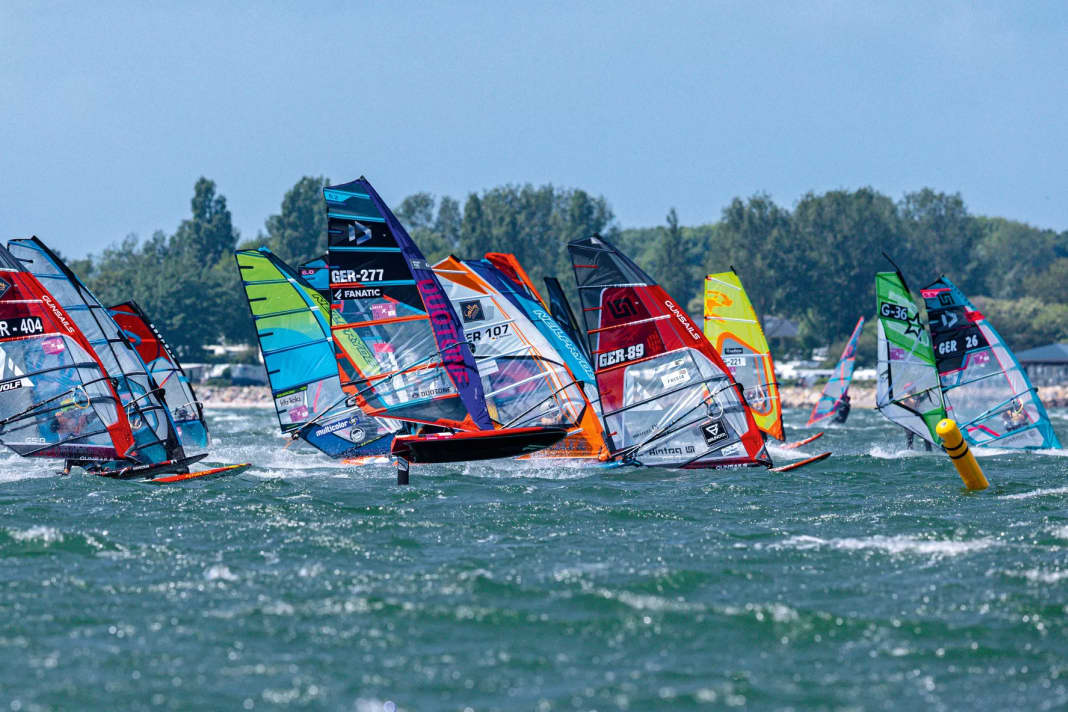





Oliver-Tom Schliemann and Leon Delle have been on the regatta circuit for two decades in their early 30s. Both have a full-time job and can't exactly complain about being bored. Nevertheless, they have been organising the Racer of the Sea (ROTS) regattas since 2020 - on a voluntary basis. What began as a small project has now developed into the regatta with the most participants in Germany. Reason enough to ask the two of them about their successful concept.
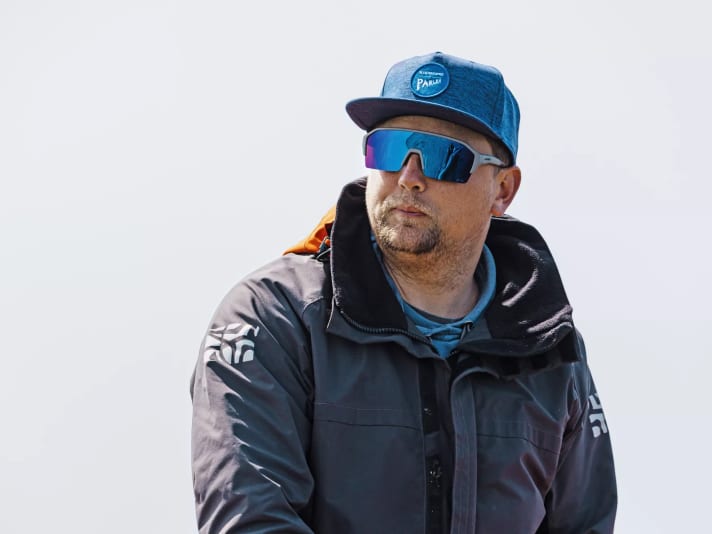
What was your motivation to set up ROTS back then?
Oliver: We ourselves competed in various national and international regattas for many years. When you talk to people on the beach about regattas, you sometimes realise that many amateur racers would love to take part in races, but don't have the confidence to do so for various reasons.
What do you think puts newcomers off? Entry fees? The regulations? The high power density?
Leon:I think the masses have a desire to compete. At the beginning, many people think they're not good enough. That's exactly where we wanted to start when we launched the Racer of the Sea concept in 2020. Our regattas are for all levels. The main thing is that you can go straight and change direction halfway. It's a shame that competitive sailing often comes across as a bit elitist. But it's actually something that can be fun for everyone. Ultimately, we also wanted to give something back to the sport with this project. The project aims to motivate beginners, young people and women in particular to take part in regattas. After all, they are generally underrepresented in national and international regattas.
"Our regattas are for everyone. The main thing is that you can go halfway straight and somehow change direction." Leon Delle
Why do you think that is?
Leon: No matter who it is, it is always important not to be alone, but to be part of a community. If you come to a regatta as a woman and then have to start alone in the men's field, the fun usually falls by the wayside. However, due to the small number of female participants, many organisers have so far had no choice but to send women and men onto the course together. Oliver: The choice of spot is also a factor. The rough North Sea in Sankt Peter-Ording or on Sylt is a challenge for regatta newcomers. It's similar for young beginners. They want to have a fun weekend and have a good time with their parents or friends. The entry fee is also a factor in their decision to take part in an event. That's why we try to keep this potential hurdle as low as possible.
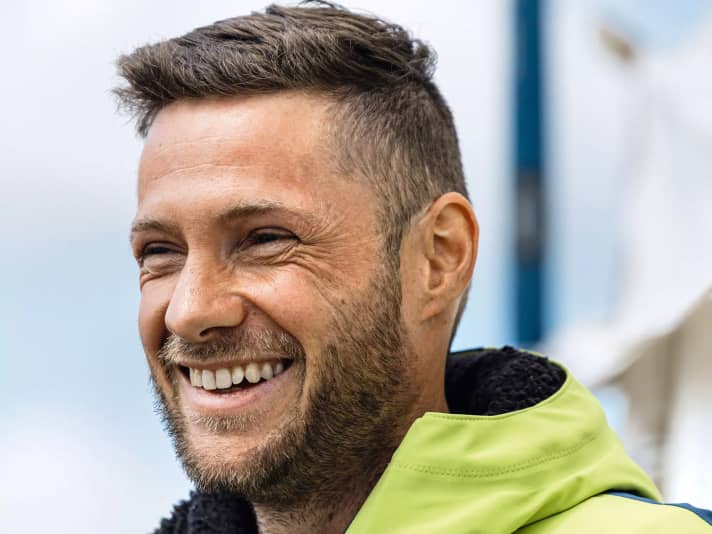
Your first ROTS had 30 participants. How has it developed so far? The last two years have not exactly been easy for event organisers.
Leon:We started in 2020 in the middle of the pandemic and immediately realised that the idea could work. Due to the restrictions, we had to limit the field to 30 participants, but that was enough for us to practise. However, the bottom line was a loss. To date, the number of participants has grown, and the Racer of the Sea V on Fehmarn set a new record with 68 registrations.
If it was a loss-making business for you, why did you carry on?
Leon:We simply got good feedback. Many participants and parents thanked us - for us, that was a signal that we simply had to keep going. As we both have full-time jobs and do the whole thing on the side, it wasn't so important for us that we had to earn money from it. If we had approached everything commercially, we would probably have stopped after the first event.
Keyword entry fee: The two of you put in a lot of work and organise everything. Is ROTS a profit-orientated concept?
Oliver: We still haven't paid out a cent to date. For the first races, we borrowed everything from friends and acquaintances, from the starting boat to buoys and flags to radios. We still do the whole organisation on a completely voluntary basis - and every euro we have left over goes back into the ROTS so that we can improve the standard.
What does your regatta concept look like on the water? What distinguishes the ROTS from other regattas?
Leon: Everything should be as simple as possible. That's why there is no elimination concept where you race against each other in several heats. This often overwhelms beginners in particular. Because not only do you have to remember which heat you are in and how you have placed yourself - you also have to keep track of everything at the start line. That's why everyone at ROTS sets off together and at the same time. However, we also limit the number of participants to 50 per category so that it doesn't get too confusing. The only division we make is fin versus foil. There is always a fin field in which you only start with a fin. This is also important for beginners, because racing with a foil is quite a challenge. Another field is open in terms of fin and foil - depending on the conditions, you can decide what you want to start with. There is a separate classification.
"The fact that top national racers are also taking part is part of the great appeal of the regatta." Oliver-Tom Schliemann
There are also professionals at the start of ROTS. To what extent is that part of the concept?
Leon:The ROTS is a beginner-friendly regatta, but not a beginner regatta. Anyone can take part, including pros and semi-pros. Part of the attraction of such events is the chance to compete with the best. For many amateur surfers, socialising with Gunnar Asmussen, Nico Prien or Lina Erpenstein at a barbecue in the evening is something special. Of course, it goes without saying that they're going to be in your face during the race. However, the good regatta riders often compete on foil equipment anyway, while the hobby surfers tend to use fins. This means you always have someone to compete with. Everyone has a result in every race and therefore just as much time on the water as the best. In the elimination system, the slowest are eliminated in the first round - and then just watch the rest of the time.

Where is ROTS heading? Will there soon be a second Defi in Germany and are you full-time organisers?
Oliver: We are always looking for sponsors to support our events. Our aim is for every participant to go home with a prize. To this end, we have a raffle at every event, which is filled with goodies from our partners. We also organise a barbecue together. And of course we reinvest money in the equipment. We recently bought two launch boats on Ebay classifieds. So everything is slowly growing. But it should remain primarily a voluntary endeavour.
Many events start out with a certain idealism. At some point, they become big and commercialised. Will there soon be fish stalls and party tents at ROTS?
Leon: We have been making a profit with ROTS since the second year. But that's actually only because we don't pay ourselves a salary. If we charged for the hours worked, it would be a different story. We already have ideas for the future, but the basic idea of the event should remain untouched. At the moment, the entry fees roughly cover the fixed costs - and everything else, such as the raffle or the barbecue, is financed by sponsors.
There are currently two events a year. Should it stay that way?
Oliver:So far we have had five events with a total of 140 different participants. This makes us the largest shortboard regatta series in Germany. There were 38 young people taking part, which is the largest field of youngsters - and 18 women, which is also a record. We are very proud of this and see it as a mandate to keep pushing forward. But that doesn't mean that we want to organise five events a year in the future. The calendar is already full enough due to the different classes in windsurfing. We prefer quality over quantity. We are trying to create good additions to ROTS. Since this season, we have also been organising the ROTS Academy, which is a training day before the race. We offer regatta training for ten to 15 participants: Starting behaviour, flags, tactics, material set-up. We also organised a girls' camp for the first time in 2022.

So you don't want to compete with established regatta formats such as the German Windsurf Cup, do you?
Leon:No. We don't want to overstretch the regatta programme. The basic idea was always to only create offers that didn't exist before and, in our opinion, create added value. With two ROTS events a year, at the surf festival and in autumn at the Hemmelmark campsite in Eckernförde Bay, we are already on the right track. We also have ideas to promote young talent and women. A kids' camp would be great, but Vincent Langer is already doing a great job. A smaller version of the Defi Wind long-distance race or a race around Fehmarn would also be conceivable. Oliver: Of course, our time quotas are limited. In addition to our job, we continue to organise regattas ourselves and have also launched the Winger of the Sea, so the time available for further ROTS regattas will be quite limited at some point. And our friends are happy when we go on holiday with them again.
With the Winger of the Sea, you have a good insight into the scene of two sports. Have you noticed that established windsurfers are migrating to wingsurfing instead?
The Winger of the Sea went well, no question about it. Wingfoiling naturally brings together people from windsurfing, kitesurfing and other sports. However, most of them continue to practise their original discipline at the same time. At ROTS, we can't say that the number of windsurfing participants is declining, on the contrary. I think that our format simply makes more people want to take part in regattas.
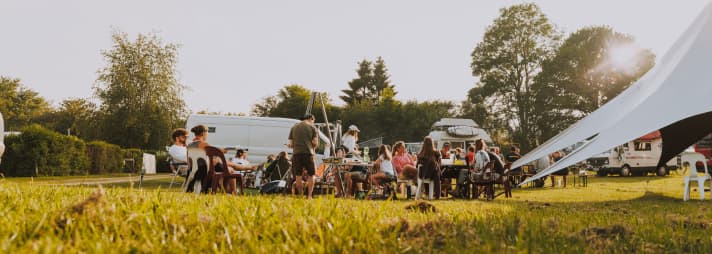
Also interesting:
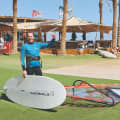
Manuel Vogel
Editor surf
Manuel Vogel, born in 1981, lives in Kiel and learned to windsurf at the age of six at his father's surf school. In 1997, he completed his training as a windsurfing instructor and worked for over 15 years as a windsurfing instructor in various centers, at Kiel University sports and in the coaching team of the “Young Guns” freestyle camps. He has been part of the surf test team since 2003. After completing his teaching degree in 2013, he followed his heart and started as editor of surf magazine for the test and riding technique sections. Since 2021, he has also been active in wingfoiling - mainly at his home spots on the Baltic Sea or in the waves of Denmark.

